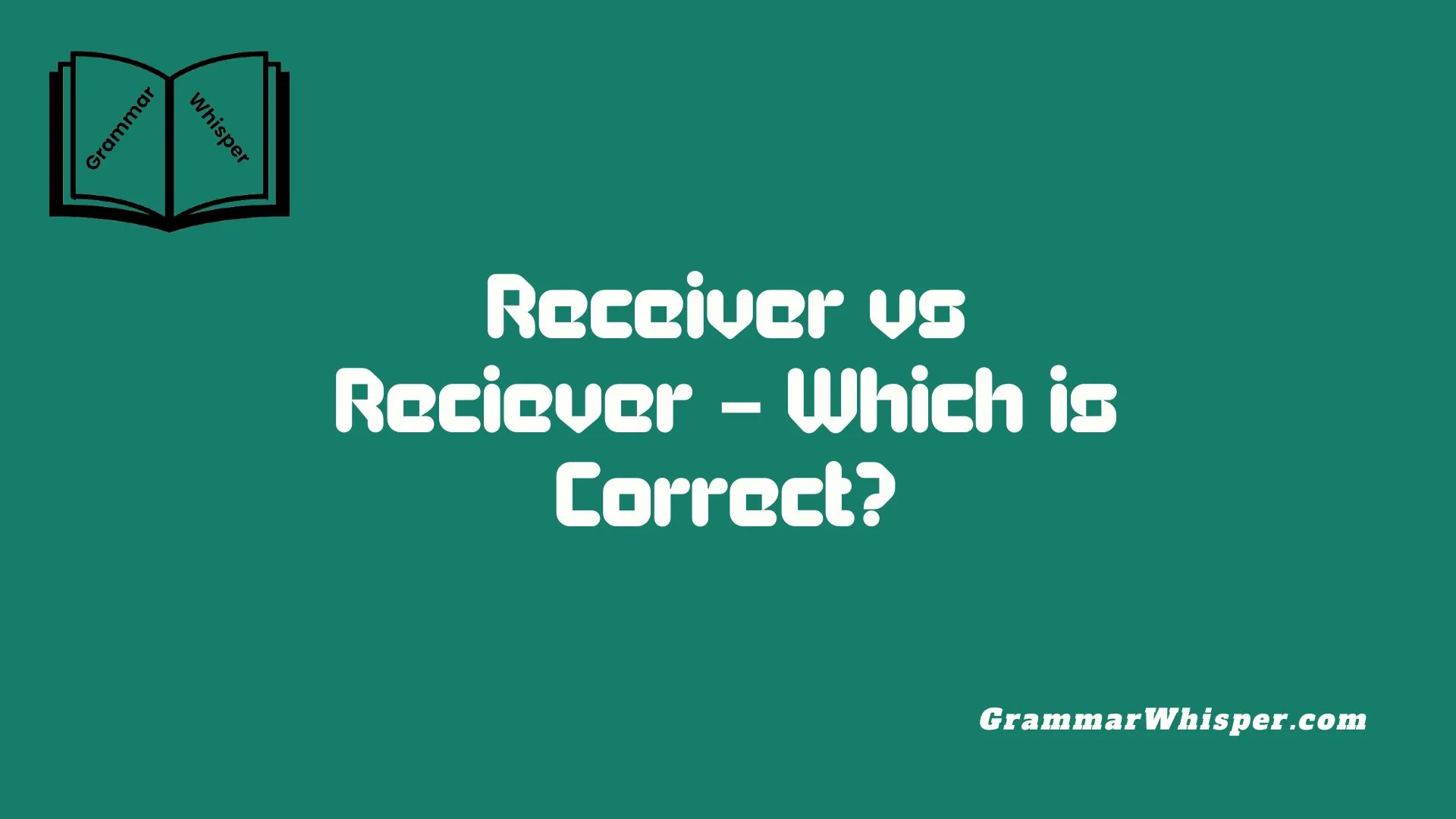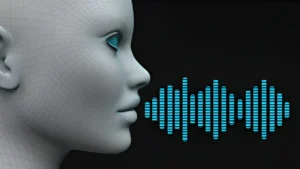I clearly remember the first time I hesitated while typing the word receiver in an important email. I had typed “Receiver vs Reciever,” and though it looked familiar, something felt off. That single word, spelled incorrectly, triggered a moment of doubt. As a writer who takes pride in polished writing, I knew even a small mistake could affect how I was perceived, especially in professional or academic communication. The correct spelling, “receiver,” is rooted in Old French receveir, with origins tracing back to Latin recipere. The version with the “ie” is simply an error, and a common one at that. Getting it right is more than a grammar issue – it’s a reflection of attention to detail.
Over time, I’ve linked the proper terms to real use – especially in business, where effective communication is key. Using the wrong spelling not only breaks flow but may raise questions about your credibility. For a student, a writer, or any professional aiming to polish their craft, recognizing these subtle distinctions helps build confidence. This article seeks to explore more than just the difference in spelling – it’s about understanding the impact of a small change. When you choose the correct form, you make a powerful statement about your commitment to clarity and precision. If you’ve ever felt confused, you’re not alone – but once you master this, it stays with you.
Receiver vs Reciever – A Spelling Breakdown
Let’s start with the most important point:
The correct spelling is “receiver.”
“Reciever” is a common misspelling, but it is not found in any standard English dictionary. Spellcheckers will flag it, and using it in professional writing can affect your credibility.
Here’s a quick visual:
| Correct | Incorrect |
| Receiver | Reciever |
The mistake often comes down to confusion with the familiar “I before E” rule, which we’ll break down below.
Understanding the Word “Receiver”
The term “receiver” isn’t just a spelling challenge – it’s a word with multiple meanings depending on the context. Understanding these will help you see how widely it’s used.
Root and Origin
- Derived from Middle English “receyvere”, which came from Anglo-French “receivre” (to receive).
- Related to the Latin word “recipere” which means to take back.
Definitions of “Receiver”
| Context | Definition |
| Technology | A device that receives signals (e.g., in a radio, TV, or smartphone). |
| Law | A person appointed to manage assets in bankruptcy or legal disputes. |
| Sports | A player who catches the ball (e.g., wide receiver in American football). |
| Communication | The person who receives a message in any communication model. |
These varied uses make “receiver” a high-frequency word in English writing and speech.
Why “Reciever” Is Always Incorrect
You won’t find “reciever” in any credible dictionary. It’s a simple spelling error, often resulting from misapplying spelling rules or typing quickly.
Common Causes
- Misunderstanding of the spelling rule
- Fast typing habits
- Overreliance on autocorrect (which doesn’t always help)
Let’s dive into that pesky spelling rule next.
Does “I Before E Except After C” Apply Here?
This famous rhyme:
“I before E, except after C.”
…can be useful – but it has exceptions.
In the case of “receive” and its derivative “receiver,” the rule does apply:
- Correct: receiver (comes after a “c”)
- Incorrect: reciever
Tip: Always check the root word. Since we spell “receive” with “ei,” we must spell “receiver” the same way.
Examples of “Receiver” in Real Sentences
Let’s see how “receiver” is used in different contexts.
Technology:
The Bluetooth receiver stopped working after the latest update.
Law:
The court appointed a receiver to manage the company’s assets during the trial.
Sports:
He played as a wide receiver for the college football team.
Communication:
In communication theory, the receiver is the one who interprets the message.
| Domain | Sentence |
| Technology | The receiver connects wirelessly to the main audio system. |
| Sports | That wide receiver made a game-winning catch. |
| Legal | The receiver has legal authority over the business’s operations. |
| Everyday Use | She picked up the receiver and made a call. |
Common Spelling Errors Like “Reciever”
Spelling errors often follow patterns. Here are other similar errors:
| Incorrect | Correct | Reason |
| Reciever | Receiver | Wrong placement of “i” and “e” |
| Acheive | Achieve | “i before e” misused |
| Percieve | Perceive | Similar confusion after “c” |
| Deceitfull | Deceitful | Extra “l” added |
| Beleive | Believe | “i before e” rule not applied |
What Causes These Mistakes?
- Visual misrecognition: what “looks right” isn’t always right.
- Speed typing: skipping the spellcheck.
- Lack of exposure to written English (reading helps!).
Why Do People Mix Them Up?
People often rely on what “feels right” when writing, especially with commonly used words. “Reciever” seems to make phonetic sense, which is why it’s a frequent typo.
Cognitive Reasons Behind the Error
- Phonetics: It sounds like it could be spelled either way.
- Muscle memory: Typists who haven’t trained in spelling may default to what they’ve typed before.
- Mislearned rules: The “I before E” rule confuses rather than helps in some cases.
Quote:
“Most spelling errors happen not because we don’t know the word, but because our brains try to take shortcuts.” – Dr. Anne Mangen, Professor of Literacy, University of Stavanger
Memory Tricks to Remember the Correct Spelling
Don’t let this small error trip you up. Try these tricks:
Visual Mnemonics
- ReCEIVE the correct spelling, and you’ll spell RECEIVER right
- Think: “You must receive before you’re a receiver.”
Break It Down
- Re + ceive + r = Receiver
Rhyme & Repeat
- “I before E after C – to write receiver properly!”
Flashcards and Spaced Repetition
Tools like Anki or Quizlet can help build spelling accuracy over time.
Check Yourself Before You Send It
Before submitting an important document or email:
Proofreading Checklist
- ✅ Did I double-check for spelling errors?
- ✅ Did I run a spell-check?
- ✅ Did I re-read aloud for fluency?
- ✅ Did I scan for common traps like “reciever”?
Recommended Tools
| Tool | Features |
| Grammarly | Real-time grammar and spelling checker |
| Hemingway Editor | Improves clarity and highlights errors |
| Google Docs | Built-in spellcheck + grammar corrections |
| Microsoft Editor | Advanced spelling/grammar features |
Practice: Use “Receiver” in the Right Context
Let’s build your confidence. Fill in the blank with the correct word:
- The wide __________ caught the winning touchdown.
- Please hand me the phone __________.
- The email __________ didn’t respond.
Answers: receiver, receiver, receiver
Pro Tip:
Create your own sentences to practice. Repetition helps engrain the correct form in your memory.
Are There Any Exceptions?
No.
Unlike many English words that have variants or regional differences, “receiver” has no accepted alternate spelling. That means:
- “Reciever” is never correct.
- It is not British vs American.
- It is not informal or slang.
If you see “reciever,” you’re looking at a typo.
Final Tips to Remember and Retain
Want to make sure you never misspell “receiver” again?
Here’s what works:
- Read more high-quality content to see the word used correctly.
- Use spelling tools – but don’t rely on them entirely.
- Understand the rules, especially “I before E except after C.”
- Practice writing the word in different contexts.
- Visualize the root word “receive” to keep the spelling anchored.
Practice: Use “Receiver” in the Right Context
Let’s build your confidence. Fill in the blank with the correct word:
- The wide __________ caught the winning touchdown.
- Please hand me the phone __________.
- The email __________ didn’t respond.
Answers: receiver, receiver, receiver
Pro Tip:
Create your own sentences to practice. Repetition helps engrain the correct form in your memory.
Are There Any Exceptions?
No.
Unlike many English words that have variants or regional differences, “receiver” has no accepted alternate spelling. That means:
- “Reciever” is never correct.
- It is not British vs American.
- It is not informal or slang.
If you see “reciever,” you’re looking at a typo.
Final Tips to Remember and Retain
Want to make sure you never misspell “receiver” again?
Here’s what works:
- Read more high-quality content to see the word used correctly.
- Use spelling tools – but don’t rely on them entirely.
- Understand the rules, especially “I before E except after C.”
- Practice writing the word in different contexts.
- Visualize the root word “receive” to keep the spelling anchored.
Summary: Receiver vs Reciever
Here’s a quick recap table:
| Aspect | Correct Usage | Incorrect Usage |
| Spelling | Receiver | Reciever |
| Dictionary Validity | ✅ Yes | ❌ No |
| Root Word | Receive | None |
| Pronunciation | /rɪˈsiːvər/ | Same, but misleading spelling |
Key Takeaways
- Only “receiver” is correct.
- “Reciever” is a common misspelling, but it has no place in professional writing.
- Understanding the spelling rules, origin, and meaning of the word can help you avoid this error permanently.
Final Thoughts
Spelling matters – especially in a digital world where clarity, precision, and trustworthiness are critical. The confusion between “receiver” and “reciever” may seem minor, but consistently using the wrong form can damage your writing credibility and professional image.
Remember:
- “Receiver” is the only correct spelling.
- It follows the classic spelling rule: “I before E, except after C.”
- “Reciever” is a common but incorrect misspelling.
- Spelling errors can reduce SEO performance, brand trust, and reader engagement.
In any context – legal, technical, sports, or general communication – receiver is the word you want. Keep practicing, use tools, and lean on mnemonic devices to build permanent accuracy.
FAQs
What is the correct spelling – Receiver or Reciever?
The correct spelling is receiver. The spelling reciever is incorrect and is not recognized in any official dictionary. Always use receiver, especially in formal writing or professional communication.
Why do so many people spell it as “reciever”?
People often apply the “I before E” rule without remembering the full version: “I before E, except after C.” Since “receiver” has the “C” before the “ei,” the correct spelling is receiver. Phonetics also mislead people because both versions sound the same when spoken.
How can I remember the correct spelling of “receiver”?
Break it down:
- Receive + r = receiver. Use mnemonics like:
- “I before E after C”
- Visualize the root word “receive” and extend it logically.
Apps like Anki or flashcards can help reinforce it with repetition.
Is “reciever” ever acceptable in informal writing or slang?
No. Reciever is always a spelling error, even in informal contexts. It has no legitimacy in regional dialects, technical jargon, or casual communication. If you see it in a document, it’s a typo that needs correcting.
Does spelling “receiver” wrong affect SEO or professional credibility?
Yes, it can. Misspelled words can hurt search rankings, reduce your website’s authority, and trigger trust issues with readers. Employers, editors, or clients might see frequent errors as a red flag. In writing, credibility starts with correctness.
Let me know if you’d like this formatted for a specific CMS (WordPress, Ghost, etc.) or expanded with images or tool recommendations.











